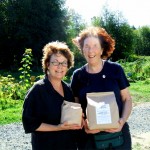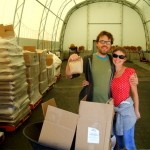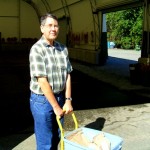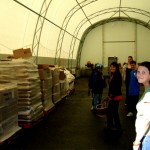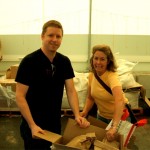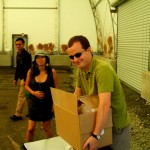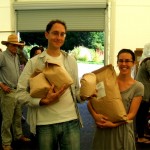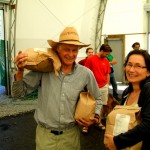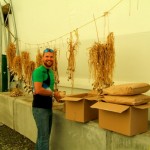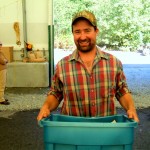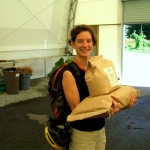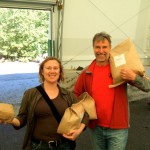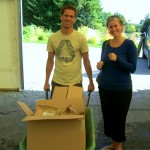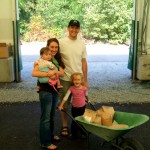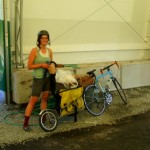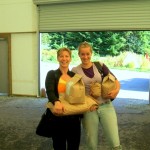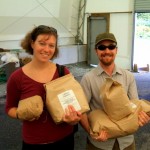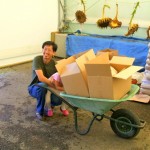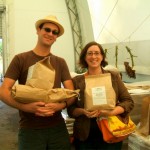The following letter was recently sent to all subscribers to the Urban Grains mailing list.
Hello local eaters,
Although our blog posts have largely replaced the monthly e-mail updates sent to shareholders and mailing list subscribers, we thought that a number of recent developments with the CSA warranted another e-mail update. Before I begin with the newsletter, however, I’d like to make an announcement regarding the future administration of Urban Grains.
Back in May, Ayla and I wrote of our visit to Halifax on the Urban Grains blog. One of the reasons for our visit was to explore the possibility of relocating there. After many months of consideration, we are now in the process of doing just that. At the time we first conceived of Urban Grains, the prospect of moving to Halifax was already on our minds, so we’ve gone to great lengths from the outset of the program to ensure that it will continue on without us. Not only have we worked to lay as much of a foundation for Urban Grains as possible prior to our departure, our partnership with Farm Folk / City Folk means that the resources, experience and expertise of their organization (well beyond anything that we can bring to the table) guarantees a future for the CSA.
When Urban Grains was still in its infancy last year, we were presented with two choices, neither of which were very palatable: 1) work to address a need for local grain in Vancouver knowing that, if something came of our efforts, we may have to leave it all behind or 2) simply do nothing. Given our shared passion for food and a concern for its many attendant issues (of which access to locally grown foods is certainly one), the latter option seemed unacceptable. While we’re sad to distance ourselves from a project which is only now beginning to realize its potential, we can at least rest easy knowing that Urban Grains will be left in good hands.
Ayla and I will, of course, remain involved with the CSA, albeit from a distance. Chris Hergesheimer, one of the organizing members of Urban Grains and the grain expert for Farm Folk / City Folk, will be assuming the role of program coordinator. He’ll be responsible for most CSA correspondence and administration in the future, so you can expect to be receiving e-mail updates and notifications from him from now on. Chris will also be running the blog and has just posted a personal introduction which you can read here.
We’ve encountered many obstacles in starting this program, some of which seemed insurmountable at the time, but we’ve managed to make-do nonetheless. Thank you so much for your support. The Urban Grains CSA is, by its very nature, a community effort and we wouldn’t have made it this far if it wasn’t for your tremendous interest and enthusiasm for the project. Here’s to a future of local grain come September.
Sincerely,
Martin + Ayla
Now, Back to Business…
The past six months have been truly amazing. What was only an idea in its early stages of conception late last year — creating the first CSA to provide local grain to people throughout Vancouver — is fast becoming a reality. If you’ve been following the updates on the Urban Grains blog, you’ll know that the grain at Cedar Isle has been progressing extremely well. While we have encountered some minor problems with rust on the winter wheat, it appears as though the great growing conditions we’ve experienced this season will more than make up for it. Of course, much work remains to be done (another month or so of growing, then harvesting, cleaning, shipping, milling and distribution) and many potential pitfalls abound (a poorly timed rain during harvest could be disastrous), but we’re finally beginning to see the light at the end of the tunnel.
Grain Cleaner
Each share this year came with a $10 equipment fee. Using this money, we were able to get a fantastic deal on a newly refurbished Kipp Kelly Dockage Tester from Manitoba. This small grain cleaner, while not entirely practical for cleaning enormous quantities of grain, cleans to a very high standard and helps us to overcome one of the main obstacles for local grain production in B.C. — a severe lack of infrastructure. If the grain harvested at Cedar Isle this summer is relatively free of weeds and other non-grain material, the cleaner may not actually be necessary in our first year of operation, but we can now rest easy knowing that cleaning quality will be less of a concern in the future. For pictures and video of the cleaner in action, go here.
Farm Visit
On July 19th, Urban Grains shareholders were given the opportunity to visit Cedar Isle Farm to see first-hand how their grain was progressing and picnic with their fellow CSA members. The weather was beautiful, there were hay-rides (always popular with both the young and old), a grain cleaning demonstration, lots of ice cream, and delectable blueberry tarts courtesy of Mary Mackay from Terra Breads. With nearly a hundred people in attendance, I’d say the event was a big success. Some pictures from the visit are available on the blog. I’d like to thank Jim, Diane, Hannah and Simon for making the event possible and for being such gracious hosts.
Distribution Date and Location
A number of you have contacted us to inquire when the grain will be ready for pickup. I realize that schedules are busy for many of us during the summer and a lack of certainty surrounding the grain pickup can be a major inconvenience. While I still can’t give you an exact date, I can say with relative certainty that the pickup time will be sometime in September, most likely in the first or second week. I just spoke with Jim today and he said that he is in the process of harvesting the winter wheat now and expects the rest of the grain to be ready in mid to late August, depending on the weather and the status of the grain.
As for the location, we’ve been speaking with the UBC Farm (located on campus at the University of British Columbia) and are trying to work out an arrangement whereby CSA members can drop by on certain dates to pickup their shares. Everything still remains to be finalized, but I’ll let you know as soon as more information becomes available.
Introducing Chris Hergesheimer
As I mentioned earlier, Chris will be taking over the operational and administrative side of things as program coordinator for the CSA. If you have any questions, or would simply like to say hi, you can contact him at the new Urban Grains administrative address, urbangrains@gmail.com.
That’s it for now. Make sure to check out the blog (https://www.urbangrains.ca/) for more up-to-date developments.
Cheers,
Martin + Ayla
Urban Grains
 After a cool, wet spring, the wheat is now maturing fast.
After a cool, wet spring, the wheat is now maturing fast.















